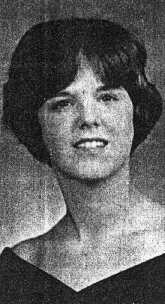Page 84
[Begin Tape 1, Side A]
Pitt: I look back on that and think, overall, it was a good thing, and it was a healthy thing that we questioned and challenged our own government to the extent that we did, and I'm sorry it's not done more now, to tell you the truth. I think kids on college campuses now are not nearly as active and committed and dedicated as we were, but maybe we're just waiting for the pendulum to swing back. I don't know.
Brunet: Were you also involved in the other protest movements, such as civil rights and women's rights?
Pitt: Yes. In fact, of course, we were in sex-segregated dorms. There were no men in the women's dorms, and vice versa, and there were some very strict rules. Believe it or not, we had to be in our rooms by 9 p.m. every night, except on weekends I think we were allowed to stay out until eleven, maybe midnight, I can't remember. But I can remember marching around the women's dormitory, chanting, "Um baw gowwa, we got the powwa!" I don't remember where that came from or what, but this was the chant that we were all using, and the whole purpose of that was to open up the dorms so that the women could go out. I think the men's dorms had no restrictions on the hours. They didn't have to be back at a certain time, but the women did. We had to be back in the dorm. They literally locked the doors. There was a back way you could get in, but if you opened that door a big alarm went off and everybody came running, so they would know that you had come in late. I believe that there was a real disparity between how they treated the men in the dorms and how they treated the women.
Oh, yes, we marched around and we chanted and we sat in and did all those things where you sit in the dean of women's office, I guess we did. I don't really remember a lot of details about what happened. I believe we got some changes on the hours. I don't think that we got them completely lifted, but I do seem to think we got them expanded somewhat. And it wasn't too many years after I left that they had co-ed dorms and things opened up, but when I was there it was very different from what it is now.
Brunet: Were you also involved in the civil rights protests?
Pitt: I don't remember too much about that. I can remember going to programs. I remember Dick Gregory* coming to speak, and I can remember going to those programs and certainly being a participant in signing petitions and whatever things were going on.
At one point during my college career, of course, I was in West Virginia, and Senator [Robert C.] Byrd, who still is in the Senate, but he's given up his leadership position, but he had been a member of the Ku Klux Klan apparently back in the fifties or something, and I can
______________________ * Dick Gregory (b. 1932), comedian and civil rights activist.

